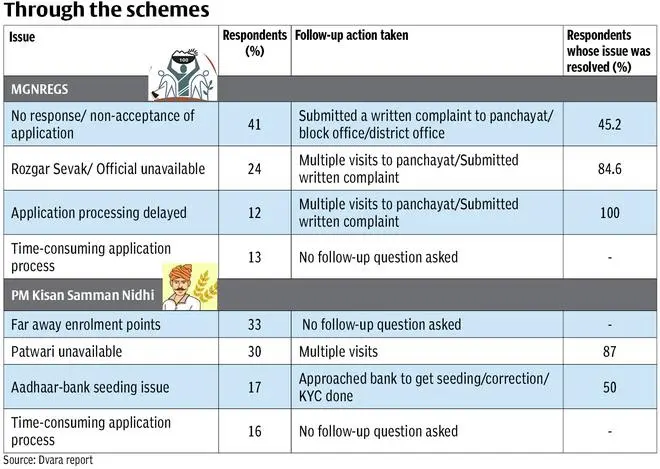A variety of exclusionary factors can be found at every stage of the delivery pipeline of Direct Benefit Transfers (DBT), a survey by Dvara Reserch has revealed.
The survey is based on response from around 2,500 respondents in seven States — Uttar Pradesh, Madhya Pradesh, Bihar, Tamil Nadu, Assam, Chhattisgarh and Andhra Pradesh. The agency has also given recommendations for improvement in enrolment and grievance redress mechanism.
DBT, which was started on January 1, 2013, with an aim to reform government delivery system, now covers 313 schemes under 53 Central ministries and departments. All 28 States and nine Union Territories (UTs) have adopted DBT for distributing various welfare initiatives, including subsidies. The Centre claims it managed to save over ₹2.22-lakh crore as of March 31, 2021, with the help of DBT.

The issue
Based on the responses, the agency has listed three issues each related with enrolment and receiving the payment. For example, one of the most prominent issues faced by citizens attempting to enroll is the lack of accessibility/proximity to enrolment points, unavailability, or erratic availability of officials/operators responsible for enrolment, etc.
Similarly, there are delays in accepting and pushing the applications forward. Some of the respondents also talked about difficulty in procuring the required documentation and errors/issues found therein.
In terms of receiving money in their bank accounts through DBT, one of the most prominent issues is disruptions to payment schedule. Reasons for disruptions could be spelling errors in Aadhaar details, pending KYC, frozen or inactive bank accounts, mismatch in Aadhaar and bank account details, etc.
Even after money credited in the accounts, respondents spoke about issues such as travelling long distances to withdraw cash, erratic functioning of cash out points, etc.
‘Speedy implementation’
The agency feels there is an urgent need to increase the accessibility of enrolment points for citizens across schemes, specifically in rural and peri-urban areas. To that end, “We recommend the speedy implementation of the objectives laid down in the Memorandum of Understanding between the Ministry of Panchayati Raj and CSC e-governance Services India Limited,” it said.
Further, it recommend the creation of a common grievance redress cell for all DBT schemes across tiers — State, district, and block. “A cell at each tier must be assigned with the task of collating and live-tracking all complaints generated at its sub-tiers and ensure timely redressal of grievances,” the agency said, while adding, the specific reason for credit failure must be added to the online record of DBT beneficiaries, along with information on the next steps to resolve the issue.




Comments
Comments have to be in English, and in full sentences. They cannot be abusive or personal. Please abide by our community guidelines for posting your comments.
We have migrated to a new commenting platform. If you are already a registered user of TheHindu Businessline and logged in, you may continue to engage with our articles. If you do not have an account please register and login to post comments. Users can access their older comments by logging into their accounts on Vuukle.